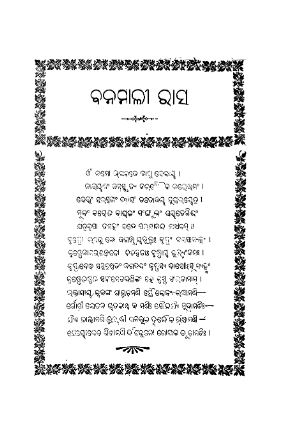Banamali Rasa, authored by the venerable poet Banamali Das, stands as a towering masterpiece in the realm of Odia literature, particularly in the domain of devotional poetry. This anthology is an eloquent testament to the beauty and depth of Radha-Krishna love, a theme that has eternally fascinated poets, artists, and devotees alike across the Indian subcontinent. Through a melodious confluence of poetic excellence and spiritual profundity, Banamali Das immortalizes the divine romance and philosophical undertones of Radha and Krishna’s relationship in his work.
Born in the late 17th century, Banamali Das was a devotee of Lord Krishna, embodying the quintessential qualities of bhakti (devotion) and viraha (divine longing). His life and poetry were profoundly influenced by the Bhakti movement, which emphasized a personal connection with the divine, bypassing the need for ritualistic formalities. The essence of his devotion is meticulously interwoven into the fabric of Banamali Rasa, making it a scintillating reflection of his innermost spiritual experiences and yearnings.
One of the central themes of Banamali Rasa is the exploration of the intricate and transcendental relationship between Radha and Krishna. Radha symbolizes the mortal soul (jiva), while Krishna represents the divine (paramatma). Their interactions, as depicted by Banamali Das, are not merely an earthly romance but an allegory for the eternal dance of union and separation between the soul and the divine. This metaphorical narration offers readers profound insights into the nature of divine love, devotion, and the longing for spiritual union.
Banamali Das employs a rich tapestry of natural imagery, drawing from the bucolic landscapes of Vrindavan—lush groves, blooming flowers, the serene Yamuna River, and the enchanting melodies of Krishna’s flute. These elements are skilfully used to evoke a sensory experience that transcends the mundane and transports the reader into a realm of divine ecstasy.
The poetic form in Banamali Rasa is marked by its lyrical beauty, rhythm, and musicality. Banamali Das’s use of chhanda (metrical verse) and pada (lyrical songs) showcases his command over the Odia language and its poetic traditions. His simple yet evocative language allows the profound emotional and spiritual undertones of his poetry to resonate deeply with the readers.
Banamali Rasa also reflects the influence of earlier devotional poets such as Jayadeva, whose Gita Govinda similarly celebrates the divine love of Radha and Krishna. However, Banamali’s unique voice and personal spiritual experiences impart a distinct flavor to his poetry, simultaneously honoring classical traditions and contributing to their evolution.
Banamali Rasa has not only enriched Odia literature but has also played a vital role in the cultural and spiritual life of Odisha. Its verses are often recited in temples, during religious festivals, and at gatherings of devotees, continuing to inspire and elevate the spiritual consciousness of its audience. The text serves as both a devotional guidebook and a literary treasure, offering insights into the profound nature of divine love and the eternal quest for spiritual fulfillment.
In essence, Banamali Rasa by Banamali Das is much more than a collection of poems; it is a luminous beacon of bhakti literature, capturing the sublime essence of Radha-Krishna’s divine love. Through its mellifluous verses, Banamali Das invites readers on an inner journey towards spiritual awakening, making it an everlasting jewel in the crown of Odia poetry.
Books Info
| Books name | Banamali Rasa |
| Author | Banamali Das |
| No Of pages | 123 |
| Publisher | NA |
| Publication | NA |
| Printed At | NA |
| Distributor | NA |

